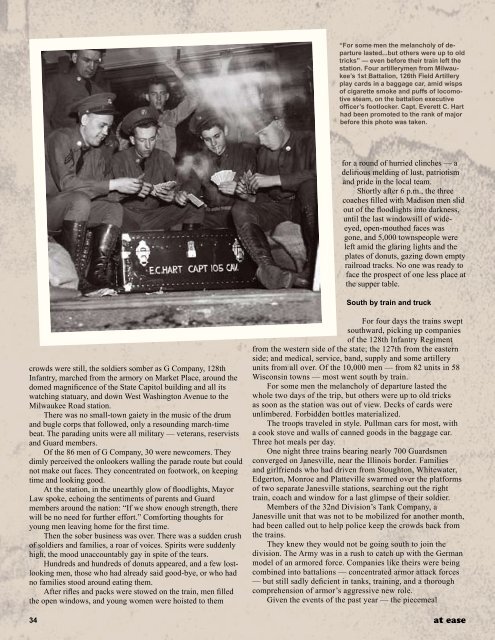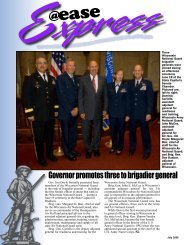At Ease - Wisconsin National Guard Department of Military Affairs
At Ease - Wisconsin National Guard Department of Military Affairs
At Ease - Wisconsin National Guard Department of Military Affairs
Create successful ePaper yourself
Turn your PDF publications into a flip-book with our unique Google optimized e-Paper software.
crowds were still, the soldiers somber as G Company, 128th<br />
Infantry, marched from the armory on Market Place, around the<br />
domed magnificence <strong>of</strong> the State Capitol building and all its<br />
watching statuary, and down West Washington Avenue to the<br />
Milwaukee Road station.<br />
There was no small-town gaiety in the music <strong>of</strong> the drum<br />
and bugle corps that followed, only a resounding march-time<br />
beat. The parading units were all military — veterans, reservists<br />
and <strong>Guard</strong> members.<br />
Of the 86 men <strong>of</strong> G Company, 30 were newcomers. They<br />
dimly perceived the onlookers walling the parade route but could<br />
not make out faces. They concentrated on footwork, on keeping<br />
time and looking good.<br />
<strong>At</strong> the station, in the unearthly glow <strong>of</strong> floodlights, Mayor<br />
Law spoke, echoing the sentiments <strong>of</strong> parents and <strong>Guard</strong><br />
members around the nation: “If we show enough strength, there<br />
will be no need for further effort.” Comforting thoughts for<br />
young men leaving home for the first time.<br />
Then the sober business was over. There was a sudden crush<br />
<strong>of</strong> soldiers and families, a roar <strong>of</strong> voices. Spirits were suddenly<br />
high, the mood unaccountably gay in spite <strong>of</strong> the tears.<br />
Hundreds and hundreds <strong>of</strong> donuts appeared, and a few lostlooking<br />
men, those who had already said good-bye, or who had<br />
no families stood around eating them.<br />
After rifles and packs were stowed on the train, men filled<br />
the open windows, and young women were hoisted to them<br />
“For some men the melancholy <strong>of</strong> departure<br />
lasted...but others were up to old<br />
tricks” — even before their train left the<br />
station. Four artillerymen from Milwaukee’s<br />
1st Battalion, 126th Field Artillery<br />
play cards in a baggage car, amid wisps<br />
<strong>of</strong> cigarette smoke and puffs <strong>of</strong> locomotive<br />
steam, on the battalion executive<br />
<strong>of</strong>ficer’s footlocker. Capt. Everett C. Hart<br />
had been promoted to the rank <strong>of</strong> major<br />
before this photo was taken.<br />
for a round <strong>of</strong> hurried clinches — a<br />
delirious melding <strong>of</strong> lust, patriotism<br />
and pride in the local team.<br />
Shortly after 6 p.m., the three<br />
coaches filled with Madison men slid<br />
out <strong>of</strong> the floodlights into darkness,<br />
until the last windowsill <strong>of</strong> wideeyed,<br />
open-mouthed faces was<br />
gone, and 5,000 townspeople were<br />
left amid the glaring lights and the<br />
plates <strong>of</strong> donuts, gazing down empty<br />
railroad tracks. No one was ready to<br />
face the prospect <strong>of</strong> one less place at<br />
the supper table.<br />
South by train and truck<br />
For four days the trains swept<br />
southward, picking up companies<br />
<strong>of</strong> the 128th Infantry Regiment<br />
from the western side <strong>of</strong> the state; the 127th from the eastern<br />
side; and medical, service, band, supply and some artillery<br />
units from all over. Of the 10,000 men — from 82 units in 58<br />
<strong>Wisconsin</strong> towns — most went south by train.<br />
For some men the melancholy <strong>of</strong> departure lasted the<br />
whole two days <strong>of</strong> the trip, but others were up to old tricks<br />
as soon as the station was out <strong>of</strong> view. Decks <strong>of</strong> cards were<br />
unlimbered. Forbidden bottles materialized.<br />
The troops traveled in style. Pullman cars for most, with<br />
a cook stove and walls <strong>of</strong> canned goods in the baggage car.<br />
Three hot meals per day.<br />
One night three trains bearing nearly 700 <strong>Guard</strong>smen<br />
converged on Janesville, near the Illinois border. Families<br />
and girlfriends who had driven from Stoughton, Whitewater,<br />
Edgerton, Monroe and Platteville swarmed over the platforms<br />
<strong>of</strong> two separate Janesville stations, searching out the right<br />
train, coach and window for a last glimpse <strong>of</strong> their soldier.<br />
Members <strong>of</strong> the 32nd Division’s Tank Company, a<br />
Janesville unit that was not to be mobilized for another month,<br />
had been called out to help police keep the crowds back from<br />
the trains.<br />
They knew they would not be going south to join the<br />
division. The Army was in a rush to catch up with the German<br />
model <strong>of</strong> an armored force. Companies like theirs were being<br />
combined into battalions — concentrated armor attack forces<br />
— but still sadly deficient in tanks, training, and a thorough<br />
comprehension <strong>of</strong> armor’s aggressive new role.<br />
Given the events <strong>of</strong> the past year — the piecemeal<br />
34 at ease





